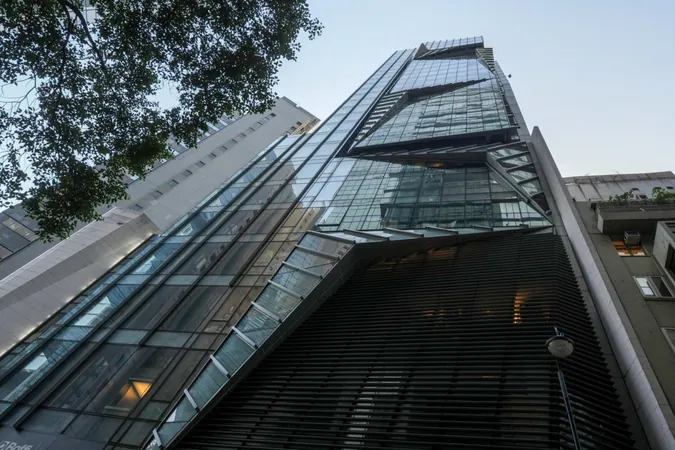
Hong Kong's Commercial Real Estate Crisis: How High Interest Rates and Economic Slumps are Reshaping the Landscape
2024-09-28
Overview of the Crisis
In a sobering exploration of Hong Kong's commercial real estate (CRE) market, experts reveal a landscape marred by high interest rates and dwindling tenant confidence. Once dubbed the world's costliest shopping district, Causeway Bay now faces a stark reality as property owners scramble to manage debt repayments amidst a severe market downturn.
Case Study: Cubus Building
Cubus, a 25-storey mixed-use building situated in the heart of this bustling district, was recently put up for sale as its owners—local real estate fund Phoenix Property Investors and a connected entity to Sa Sa's chairman, Simon Kwok—struggled with rising debt and declining rental income. The building's public tender process began at an opening price of HK$1.4 billion (around US$180 million), significantly lower than its peak valuation of HK$2 billion. Alarmingly, more than a third of its floors currently sit vacant, reflecting a broader trend in the city's CRE market.
Factors Contributing to the Decline
Several factors are fueling this decline. The Hong Kong economy is grappling with the fallout from China’s sluggish economic growth, changes in consumer habits, and a mass departure of international firms due to ongoing geopolitical tensions and stringent COVID-19 policies. The situation is precarious, with many prominent real estate moguls and investors feeling the financial strain.
Market Conditions and Predictions
Benjamin Chow, head of real assets research for Asia at MSCI, paints a bleak picture, stating, "It's really a marketwide slump. Everybody has their own fair share of pain." Despite the recent rate cut from the US Federal Reserve, market experts assert it may take time for the CRE sector to recover as the fundamental economic conditions remain precarious.
Rental Price Declines
According to Cushman and Wakefield, grade A office rents have plummeted approximately 38% since their pre-COVID peak and are projected to fall an additional 7 to 9% this year. Meanwhile, retail assets have suffered even more, seeing valuations decline around 40%. Following a reduction in import taxes, mainland visitors—once a mainstay for the city's luxury market—have less incentive to shop in Hong Kong, further exasperating the crisis.
Surge in Distressed Asset Sales
As many property owners falter under high interest rates and reduced rental income, the number of distressed asset sales has surged. Data from CBRE indicates that around 75% of property transactions in the current year are distressed sales. "It’s hard to quantify the valuation decline because the market is so large," commented Reeves Yan, head of capital markets at CBRE Hong Kong. However, predictions indicate that total losses could run into the trillions.
Impact on Financial Institutions
The crisis is now starting to infiltrate Hong Kong's financial system, with banks sitting on HK$570 billion in debt exposure to troubled commercial properties as of June. Several banks, including HSBC and Hang Seng, are reporting increased default rates and a rise in non-performing loans, forcing them to reconsider their lending practices. Many banks are opting to work with distressed borrowers, but as the financial landscape deteriorates, this may prove a risky strategy.
Potential for Recovery and Systemic Risks
Though the situation is concerning, experts believe that a systemic crisis akin to the one ravaging mainland China is less likely in Hong Kong due to its more conservative local developers, lower leverage, and greater liquidity compared to their mainland counterparts. The potential for a gradual recovery remains, particularly if interest rates continue to decrease in the future, offering some relief to over-leveraged firms.
Challenges Ahead
However, the ailments of oversupply, weak demand, and fluctuating confidence echo throughout the market. The CEO of a prominent property conglomerate recently stepped down following record losses, illustrating the urgency of the situation. Some businesses, such as luxury watchmaker Omega, are taking strategic advantage of the slump, securing prime retail space at exorbitant discounts—notably, a new location on Russell Street at a staggering 70% less than previous rates.
Conclusion: A Long Bridle to Recovery
As the city inches toward potential recovery, experts caution that the road ahead may be long and fraught with setbacks. "It’s still early to declare a bottom," Chow concludes, emphasizing that the market could take until at least 2025 to stabilize. Deloitte's national leader Glen Ho echoes this sentiment, noting that the current downturn is likely to be more profound and complex than any previous cycle Hong Kong has experienced.
Looking Forward
In a situation that seems to spiral deeper into distress, many stakeholders await a more robust economic revival from the Mainland and enhanced business confidence—conditions that remain uncertain at best.


 Brasil (PT)
Brasil (PT)
 Canada (EN)
Canada (EN)
 Chile (ES)
Chile (ES)
 España (ES)
España (ES)
 France (FR)
France (FR)
 Hong Kong (EN)
Hong Kong (EN)
 Italia (IT)
Italia (IT)
 日本 (JA)
日本 (JA)
 Magyarország (HU)
Magyarország (HU)
 Norge (NO)
Norge (NO)
 Polska (PL)
Polska (PL)
 Schweiz (DE)
Schweiz (DE)
 Singapore (EN)
Singapore (EN)
 Sverige (SV)
Sverige (SV)
 Suomi (FI)
Suomi (FI)
 Türkiye (TR)
Türkiye (TR)